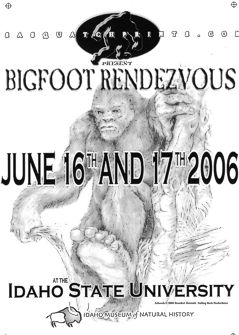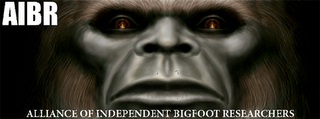Interview with Thomas Steenburg, Author and Bigfoot Researcher
 *Mr. Steenburg, 10 miles into the bush on lake Harrison*
*Mr. Steenburg, 10 miles into the bush on lake Harrison*The very first book I purchased when I became interested in the search for this undocumented North American primate, was a book written by Thomas Steenburg "In Search of Giants". You should see this book, its filled now with yellow highlights and post-it arrows and notes.. I'm still not even half-way through this book. This was the first time I had seen the use of binoculars refered to as "glassing" -- heyy,, I'm new, remember? It took me almost a week to figure out what that was, but I was thankful for the lesson. If you are new to this field of research, buying anything written by Mr. Steenburg is a must, you will not be dissapointed.
I have been very surprised by the people who have allowed themselves to be interviewed for this blog, and for me to be able to interview Mr. Steenburg was a real treat for me. When I think of researchers I would like to spend time with in the field, learning from - Mr. Steenburg is right at the top of that list. I respect and admire the work he has done. His books have been a serious look at this research, and along with John Green they are giving a credible look into what people are seeing and witnessing, by publishing books that are a serious look into this mystery.
There will always be space for Mr. Steenburg, as well as the other researchers, I have interviewed here on this blog.
Interview with Thomas Steenburg,
Author and Bigfoot Researcher
Question: Please tell the readers about yourself.
Thomas Steenburg: I'm 45 years old, born in a small country community of Bancroft Ontario, Canada, may the 6th, 1961. I moved to Calgary Alberta in 1979, was in the army at the time with the first Battalion P.P.C.L.I. Was married in 1984, Divorced 1991, concentrated on the Alberta Rockie Mountains from 1979 till 2002 when I moved to Mission British Columbia. I am still living there now.
Question: Are you an Independent Researcher or are you active in any groups or both?
Thomas Steenburg: I have been an independent researcher since the beginning. Though I have joined certain groups, which for a time, I thought was doing some good things. For example, I was an early member of the I.S.C. in the the late 1980s, but soon became disillusioned with them. In recent times I have joined, "West Coast Sasquatch", which is our local group here in the lower mainland of B.C. Also the B.C.S.C.C. (British Columbia Scientific Cryptology Club), which is also local here in Vancouver, and most recently S.R.I. (Sasquatch Research Initiative). I like the way they have no leader and every member has an equal say in what is happening, but I do guard my independence and would not allow any said group to tell me how to investigate matters, since I have been around longer than they have existed. But I will listen to suggestions and recommendations, but use my own judgment whether or not to follow any said advice.
Question: How long have you been active in the field of Bigfoot Research?
Thoma
 s Steenburg: I first became involved with actual investigations in 1979, well 1978 really, there was still two months left to go. However, I was fascinated with the whole matter since I was old enough to read. I still can remember my father saying to my mother, "Don't worry, he will grow out of this", well that never did happen.
s Steenburg: I first became involved with actual investigations in 1979, well 1978 really, there was still two months left to go. However, I was fascinated with the whole matter since I was old enough to read. I still can remember my father saying to my mother, "Don't worry, he will grow out of this", well that never did happen.One of the main reasons I enlisted in the Canadian Army, in the first place, was the the fact the third Battalion P.P.C.L.I. was stationed in Victoria on Vancouver Island and I had my way out west, where the Sasquatch were. I didn't give eastern reports too much consideration back in those days. I ended up in the first Battalion in Calgary Alberta. Took a look at the Rocky Mountains, said to myself, "Well there's no wall between B.C and Alberta to keep them out. If they are in Eastern B.C they have to be in western Alberta too". Placed an ad in local newspapers and my phone started ringing.
Follow up question: What changes over the years have you seen in this research?
Thomas Steenburg: The most important change has been the Internet. I still remember doing everything by snail mail. I was one of the last hold outs computer-wise. The interest in main stream science, who are still too slow, but compared to years past, at least some of them are looking at the whole thing with somewhat of an open mind. The number of women getting involved, and of course, the willingness of witnesses to come forward much quicker than in the past, though I still feel we only hear about 1 in 8 encounters.
Question: What has been your primary focus, in this field of study? Please explain.
Thomas Steenburg: Two really. The most important focus has been to hit the bush searching for the hard physical evidence which will prove beyond a doubt that this creature does indeed exist. Second focus was interviewing witnesses and investigating their claims hoping that that would lead to the hard evidence which is required.
Question: What keeps you asking questions?
Thomas Steenburg: Because so far I haven't been given the complete answer.
Follow up question: Why did you think this search was important enough to write books about it?
Thomas Steenburg: I felt that if the public was more aware of what was going on and how common encounters with this creature were becoming, maybe that one person who had come across remains or had shot something himself would come forward. But the first book, "The Sasquatch in Alberta" , I did that really due to the fact that nothing had been written about the Sasquatch in that province before other than the couple of incidents John Green had written about. Since that was my main area of research, I decided to write the first. However none of them have lead to information which would help find an answer to all this. Some witnesses as well are reluctant to talk to you because they think that you are going to publish the story and make them look foolish. Others will make up anything they think you want to hear hoping to see the story published.
Follow up question: Do you have any plans to write more books? A
 nything in the works?
nything in the works?Thomas Steenburg: Yes I will write some more, but nothing is in the works right now.
Question: What do you think about the growing numbers of women becoming active in this field?
Thomas Steenburg: I think it's great, what took so long? The only female I ever had much experience with in the field was the late Barbara Wasson Butler, and she was a pro from the word go. We were investigating the Mike McDonald report, (May 1997) together and we both came out leaning toward believing his encounter. It was not too long after that she passed away. I haven't heard of too many women in Canada following up on things, but in the U.S. there seems to be a recent boom in women coming forward with an interest in this subject. By recent, I mean since the mid 1990s. When I started Barbara, I think, was the only one; at least, the only one which I had met.
Follow up question: I hear the name Barbara Wasson often, can you talk a little about Barbara Wasson Butler? What do you think her contribution is to this field of research?
Thomas Steenburg: Barbara Wasson Butler was the only female researcher whom I worked with on occasion. She truly was a pro, and was unyielding in questioning witnesses. She was also a trained tracker, which not too many people know. She was in the field with Rene a lot more than myself, but the few times we were working together we seemed to be able to read each other's minds.
I remember on more than one occasion we would come to a fork on a trail and we would look at each other and off we would go not having to say a word or decide anything because we were both thinking the same thing. Her interest in the Sasquatch was a spare time interest only, having a bachelor's degree in psychology from 1948, she got her masters in 1962. If she thought you were lying to her she would tell you. She passed away Oct, 9th 1998 after a long fight with cancer.
Question: Have you had a sighting? If so please explain.
Thomas Steenburg: I don't know? Until the fall of 2003 that answer to that question was a definite no. But while heading up to 20 mile bay on the west side on Lake Harrison. High up at the top of a power line cut way, both John Miles and my self saw a figure walk from the center to the woods on the east side. It was over so fast I didn't have time to bring the rover to a stop. It did walk upright but was so far away I could not say for certain that it was not a man up there?? Why a man would be up there, I don't know? If it was not a man, then yes, I have seen a Sasquatch, if it was a man, than no I haven't yet.
Follow up question: Do you ever feel the frustration many researchers feel over time? Have you ever thought about getting out because you have not had a close proximity sighting?
Thomas Steenburg: Yes I have felt that frustration many times, but no, the idea of quitting and going on with, (As my ex-wife often said) more important things, has never occurred to me. and the only reason I can think of for that is the fact I have to know. one way or the other.

Question: One piece of equipment you think is the most important?
Thomas Steenburg: The most important piece of equipment is yourself. Without the researcher, none of these reports would ever be followed up on or recorded. No investigation would ever happen, and quite frankly, I doubt very much that society as a whole would care. Next to that, a camera of some kind.
Question: Most researchers have one report that "stands out" in their minds, is there a report that still "stands out" for you?
Thomas Steenburg: For me, as of right now, I would have to say the Crandel campground incident of the Victoria day long weekend of 1988. Four witnesses, two teachers and two engineers. Plus, the fact they did the rare thing; they reported what they saw the next morning to park officials, and made out a written report for the parks office. Darwin Gillies, one of the four, had to insist to put something in writing, even when the wardens, (what park rangers are called in Canada), said it would not be necessary. I think this incident will be thought of as a Sasquatch classic in the future. If not, it should be.
Question: What questions would you like researchers to ask witnesses?
Thomas Steenburg: I have used the same questionnaire now for the last 28 years, added a bit here and there. Rather than type the whole thing out, let me just say it's most important to let the witness answer the question at their own pace and in their own way. Do not lead or correct them. If the answer does not fit then that's the way it is. M
 aybe you have just exposed an attempted hoax. If you try to correct and guide them, then before you know it the witness is telling you what they think you want to hear rather than what they actually saw.
aybe you have just exposed an attempted hoax. If you try to correct and guide them, then before you know it the witness is telling you what they think you want to hear rather than what they actually saw.Question: What you would like people to know about you.
Thomas Steenburg: I never really thought too much about that one. I hope people, when they think of me, they know I was straight forward and honest, and that I did the best I could with the limited resources I had, and I said what I thought, and to hell with the politics.
Question: Do you have any advice for a new researcher?
Thomas Steenburg: My advice to any new researcher today is stick close to home. Become an expert on any happenings in your area, rather than running around all over the country every time somebody yells Sasquatch. Too costly to run around like that anymore. Keep an open mind and never be afraid to admit you made a mistake on this or that when the evidence points to a conclusion you had not counted on, and never put this stuff ahead of your family. That is the biggest mistake of all!
I would like to take this time to thank Mr. Thomas Steenburg for taking the time to answer my questions. I do hope to have more conversations with him in the future. :)
*Photos provided by Mr. Thomas Steenburg, and Bigfoot Encounters*




























